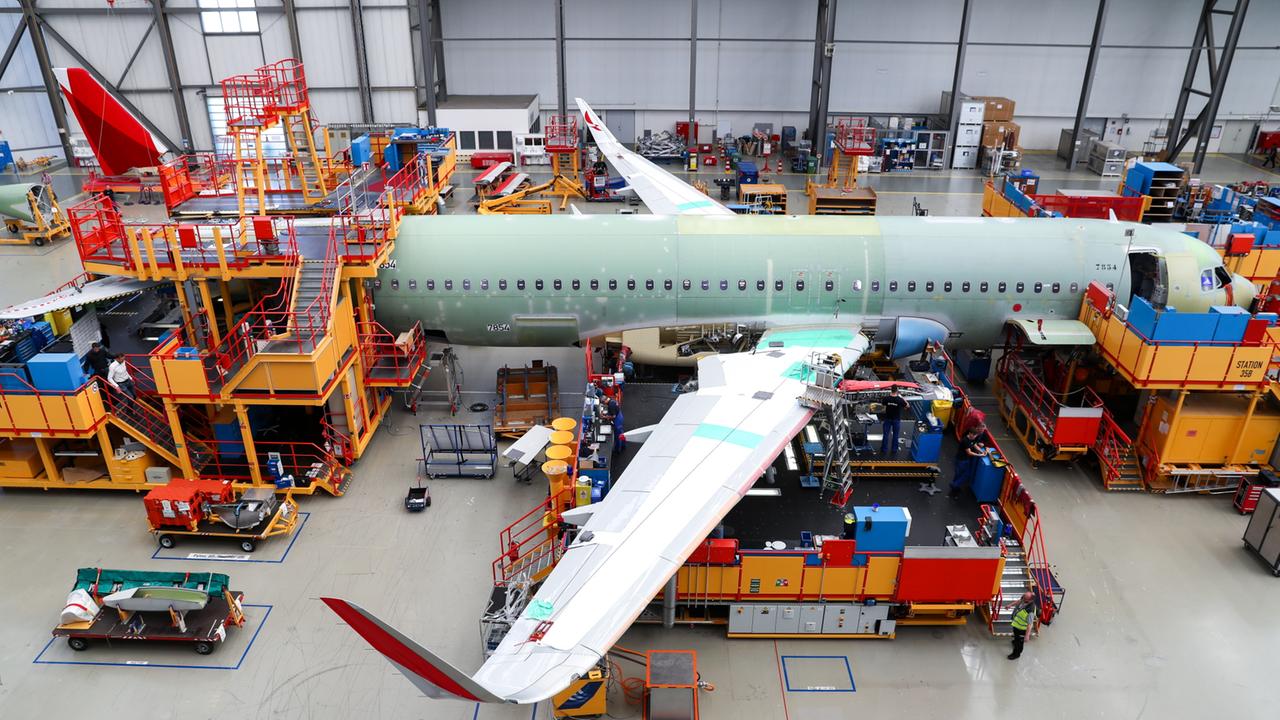analysis
Airbus can hardly save itself from orders. The company also benefits from the weakness of the competition. But the order boom also has its downsides.
The tug slowly reverses the A320 out of park, then the engines roar: the final tests are being carried out on the aircraft at the delivery center on the Airbus site in Toulouse. What looks like a terminal is the complex in which the machines are handed over to customers – and it is currently being significantly expanded.
“Previously we were able to handle four handovers a day, but in our new building there are twelve. So we have significantly increased our capacities,” says Alexis Lafont, head of delivery at Airbus in Toulouse. “And we involve our customers much more closely and earlier, for example when preparing for delivery or during final production.”
More deliveries to customers: That is Airbus’ declared goal. Because the European aircraft manufacturer can hardly save itself from orders. But it takes a while until the aircraft reaches the customer: “We don't publish exact figures. But if you order an A320 now, which is our most popular aircraft, there will be delivery slots in the next decade at the earliest,” says Lafont.
Recovery after the pandemic
Airbus delivered 735 aircraft in 2023. The corona pandemic had thrown the industry into disarray. Restarting production afterwards was a big challenge. This year the manufacturer plans to deliver around 800 aircraft; that would be slightly less than the level before Corona.
The fact that the supply chains were severely disrupted during the corona pandemic is still having an impact, says financial analyst Yan Derocles: “The entire production chain, every small part, has to be in the right place at the right time. We still haven't gotten back to that.” As Airbus announced at the annual press conference in Toulouse, the company fears that geopolitical tensions will affect the already fragile supply chains.
Tricky supplier management
Airbus CEO Guillaume Faury says ARD-Interview, the suppliers also have to go along with the planned increases in production: “The parameter that is most critical for us is how we manage our suppliers. The supply chains, like us, have to deliver at a faster pace, we have almost 3,000 suppliers .”
Airbus has therefore invested in the management of its suppliers. “We work with each supplier individually,” says Faury. “It's a lot of work, very detailed, to understand the possibilities and capacity of each supplier and to prevent bottlenecks.” The shortage of skilled workers is also causing problems for manufacturers like Airbus. The company has hired new staff in Hamburg, for example, but they also have to be trained and trained accordingly in order to be usable.
Airlines need competition from manufacturers
While Airbus can hardly save itself from orders, its competitor Boeing is in a much worse position – and not just since a Boeing 737 Max aircraft lost a fuselage part shortly after take-off on January 5th. It lags significantly behind its European competitors in terms of both orders and deliveries. Now Boeing has even announced that it will forego business forecasts for the time being.
The fact that Airbus is becoming so relatively strong is not in the interests of the airlines, says analyst Derocles. Lufthansa deliberately ordered 737 Max aircraft from Boeing in the winter. “No renowned airline would take the bet on just one manufacturer, regardless of whether it was Airbus or Boeing,” says Derocles.
More innovation through competition?
At Ryanair you can see the problems that this leads to when you rely exclusively on one manufacturer, in this case Boeing: “Ryanair will not receive the aircraft it has ordered. They will have to adjust their flight schedule and will also make less sales because they are from one manufacturer made us dependent.”
The airlines also hope that the competition will also drive innovation – for example when it comes to more climate-friendly engines. The aviation industry has set itself an extremely ambitious goal: flying should be climate-neutral by 2050.




